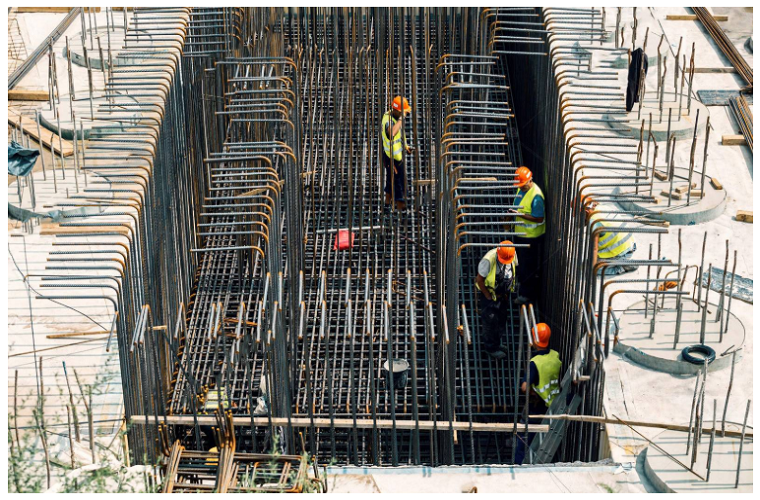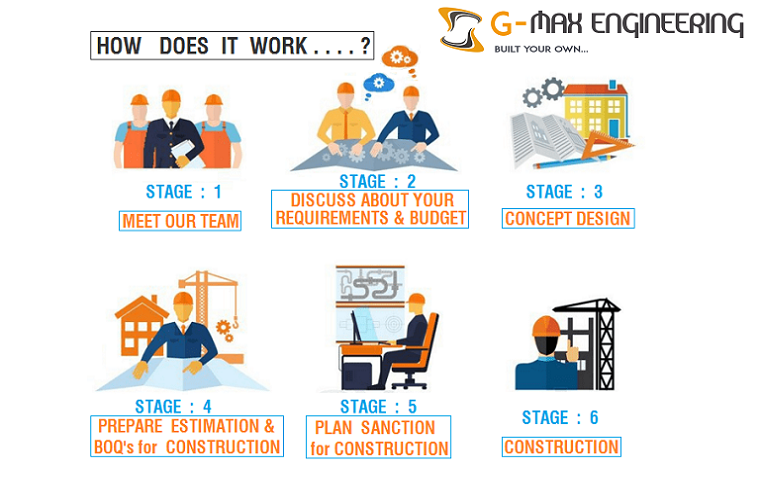Construction


CONSTRUCTION
Gmax Engineering experts, here to aid yourself with Planning and Building Regulations advice to help you find the best solution. We believe that the true growth and prosperity of a nation can be marked only through the development of credible transportation, infrastructure that can aid and enhance the development of other sectors. Keeping this in mind, we undertake the development of roadways, Infrastructure for commercial, corporate, industrial and even concrete roads for residential purposes.
Our Civil Construction service portfolio extends across various industries like
- Bridges Commercial Building
- Residential Building.
- Road Construction.
- Bridge & Flyovers.
- Solar Project.
Gmax Engineering experts, here to aid yourself with Planning and
Building Regulations advice to help you find to the best solution in simple 6
stages.


ESTIMATION & COSTING:
Parallel Check
Estimation is a service provided to end-users (normally
owner-operators, financial investors, or joint venture partners) who are
currently in the FEED process. A common approach is that CRE is hired to
perform an independent AACEI Class 3 (+/- 20%) estimate in order for the
owner-operator to receive a current snapshot of the cost at a given point,
usually midway through the FEED process. Then an AACEI Class 2 (+/-10%) will be
completed and submitted by CRE towards the end of the FEED process. Overall, as
the engineering contractor provides deliverables to the owner-operator during
FEED, the information is turned over to CRE for continuous estimate development
on behalf of the owner. The objective is to provide another cost estimating
data point to compare against the EPC contractor. In such cases, it is normally
desired for the parallel check estimate to be completed in advance of the owner
receiving the final FEED package estimate from the contractor. That way, a
review of the parallel check estimate (prepared by CRE as a non-stakeholder)
can be conducted with the owner, providing independent third-party
perspectives. Often times, a comparative analysis is developed by CRE using
both the EPC’s and CRE’ estimates to identify and highlight the gaps.
Estimate Quality Assurance & Control (QA /
QC) is a service that is typically provided as part
of a comprehensive due diligence program on behalf of owner-operators,
financial investors, or joint venture partners. CRE would interview cost
personnel (EPC) responsible for preparing the estimate to appreciate cost
estimating workflows, methodologies applied, estimating tools, as well as
assess the skill level of the cost estimators. Also, CRE would review the
estimate execution plan, the engineering deliverables, specific revisions of
the input data, and other information used to build the estimate. Additionally,
verification of key items such as bulk quantities (bill of material) for the
project would be included for QA / QC. In some cases where the information is
available, CRE can use native files from Smart P & ID programs such as
AutoCAD or Smart Plant (3D, P & ID) to conduct an automatic material
take-off. The purpose is to check and verify the existing bulk quantities
developed in the project estimate. Finally, CRE would deliver a report with
findings, conclusions, and recommendations.
Project Estimation is a service provided independently to
engineering, procurement, and construction (EPC) companies, owner-operators,
financial investors, or joint venture partners. In some cases, an
owner-operator only requests CRE to prepare the cost estimate in the early
stages of the project development process to save time and cost. In other
cases, the EPC contractor would use CRE to prepare the cost estimate because
their owner client requires quick results and the EPC is overloaded with other
projects, or the EPC does not have any internal function or capability to handle
the request. In addition, it is quite common that CRE prepares independent cost
estimates throughout the entire lifecycle of the project from concept to
construction. That is to say, there is a significant advantage of continuous
updating of the project estimate versus starting from scratch after each stage
gate approval. Supplementing the estimating team on megaprojects is quite
common, whereby CRE is only requested to evaluate specific units as part of the
overall plant or process facility.
Risk Analysis a service whereby CRE will lead to a formal risk meeting of the
project estimate in order to agree on proposed risk ranges and set the project
contingency for the estimate. The objective would be to determine the estimate
risks by identifying parameters (ranges) based on the likelihood of some
occurrences that would impact the costs in key estimate categories. From that,
CRE would perform a Monte Carlo risk analysis and work with the owner to set a
reasonable contingency value for the estimate using the organization’s
probability of overrun / underrun point.
“Cold Eyes” Review & Benchmarking is a function Where CRI reviews the project
estimate prepared by an owner-operator or EPC contractor through a series of
benchmarks and comparisons. The project estimate will be compared against
similar project types, locations, or capacities in order to identify gaps or
areas of the estimate that may be out of range according to the metrics and
ratio analysis. Then, CRE would prepare and deliver a final report with
findings, conclusions, and recommendations.
Contractor Bid or Change Order (Notice) Request
Evaluations are services
provided to owner-operators, joint venture partners, or financial investor
stakeholders. The primary objective is to provide due diligence and represent
the owner’s interest when evaluating EPC prices during contractor selection and
construction execution. CRE would support the owner’s project team in order to
assess all the quotations received during the invitation to bid (ITB) processor
while construction is ongoing. In many cases, though not required as a
prerequisite, CRE would have already prepared a Parallel Check Estimate, “Cold
Eyes” Review, QA / QC, or other Project Estimation services with advanced the familiarity of the project particulars.
Supplemental Support and Site Secondment is a solution whereby the CRE cost the estimator
would travel onsite and join the owner’s project estimating team at their
office and the goal would be to represent the owner’s interest by conducting
any of the above activities for an extended period of time. In other cases, the
CRE cost estimator is hired out by the EPC and is temporarily assigned to the
EPC’s office full time to supplement the staff during peak workload periods as
needed.

